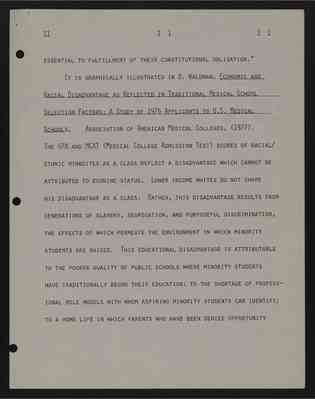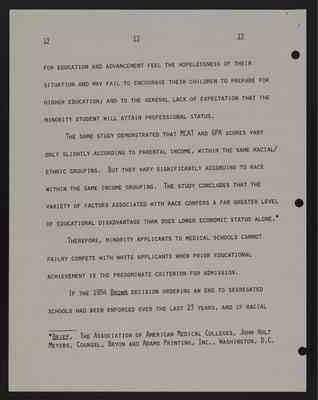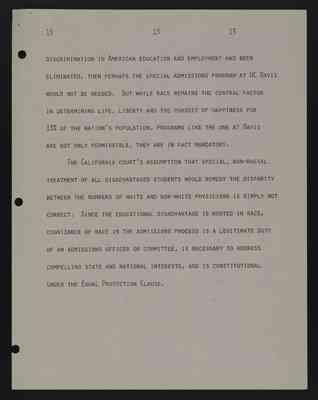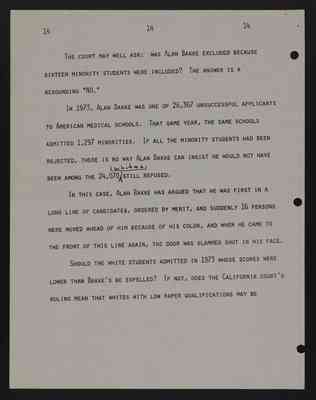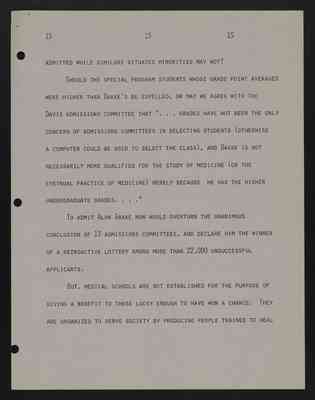Pages
11
11 11 11
essential to fulfillment of their constitutional obligation."
It is graphically illustrated in B. Waldman, Economic and Racial Disadvantage as Reflected in Traditional Medical School Selection Factors: A Study of 1976 Applicants to U.S. Medical Schools, Association of American medical Colleges, (1977).
The GPA and MCAT (Medical College Admission Test) scores of racial/ethnic minroites as a class reflect a disadvantage which cannot be attributed to econimc status. Lower income whites do not share his disadvantage as a class. Rather, this disadvantage results from generations of slavery, segregation, and purposeful discrimination, the effects of which permeate the environment in which minority students are raised. This educational disadvantage is attributable to the poorer quality of public schools where minority students have traditionally begun their education; to the shortage of professional role models with whom aspiring minority students can identify; to a home life in which parents who have been denied opportunity
12
12 12 12
for education and advancement feel the hopelessness of their situation and may fail to encourage their children to prepare for higher education; and to the general lack of expectation that the minority student will attain professional status.
The same study demonstrated that MCAT and GPA scores vary only slightly according to parental income, within the same racial / ethnic grouping. But they vary significantly according to race within the same income grouping. The study concludes that the variety of factors associated with race confers a far greater level of educational disadvantage than does lower economic status alone.*
Therefore, minority applicants to medical schools cannot failry compete with white applicants when prior educational achievement is the predominate criterion for admission.
If the 1954 Brown decision ordering an end to segregated schools had been enforced over the last 23 years, and if racial
*Brief, The Association of American Medical Colleges, John Holt Meyers, Counsel, Bryon and Adams Printing, Inc., Washington, D.C.
13
13 13 13
discrimination in American education and employment had been eliminated, then perhaps the Special Admissions Program at UC Davis would not be needed. But while Race remains the central factor in determining life, liberty and the pursuit of happiness for 13% of the Nation's population, programs like the one at Davis are not only permissible, they are in face mandatory.
The California Court's assumption that special, non-racial treatment of all disadvantaged students would remedy the disparity between the numbers of white and non-white Physicians is simply not correct. Since the educational disadvantage is rooted in Race, cognizance of Race in the admissions process is a legitimate duty of an Admissions Officer or Committee, is necessary to address compelling State and National interests, and is Constitutional under the Equal Protection Clause.
14
14 14 14
The court may well ask: was Alan Bakke excluded because sixteen minority students were included? The answer is a resounding "NO."
In 1973, Alan Bakke was one of 26,367 unsuccessful applicants to American medical schools. That same year, the same schools admitted 1,297 minorities. If all the minority students had been rejected, there is no way Alan Bakke can insist he would not have been among the 24,070 whites still refused.
In this case, Alan Bakke has argued that he was first in a long line of candidates, ordered by merit, and suddenly 16 persons were moved ahead of him because of his color, and when he came to the front of this line again, the door was slammed shut in his face.
Should the white students admitted in 1973 whose scores were lower than Bakke's be expelled? If not, does the California Court's ruling mean that whites with low paper qualifications may be
15
15
Admitted while similary situated minorities may not?
Should the special program students whose grade point averages were higher than Bakke's be expelled, or may we agree with the Davis Admissions Committee that ". . . grades have not been the only concern of Admissions Committees in selecting students (otherwise a computer could be used to select the class), and Bakke is not necessarily more qualified for the study of medicine (or the eventual practice of medicine) merely because he has the higher undergraduate grades. . ."
To admit Alan Bakke now would overturn the unanimous conclusion of 13 Admissions Committees, and declare him the winner of a retroactive lottery among more than 22,000 unsuccessful applicants.
But, Medical Schools are not established for the purpose of giving a benefit to those lucky enough to have won a chance. They are organized to serve society by producing people trained to heal
